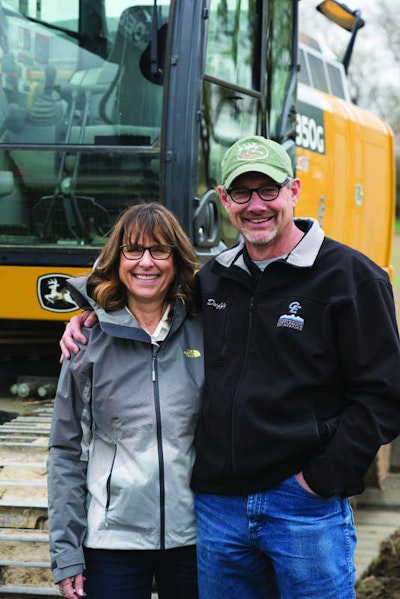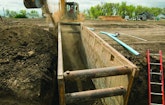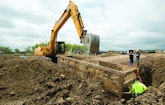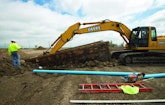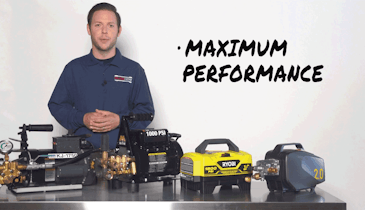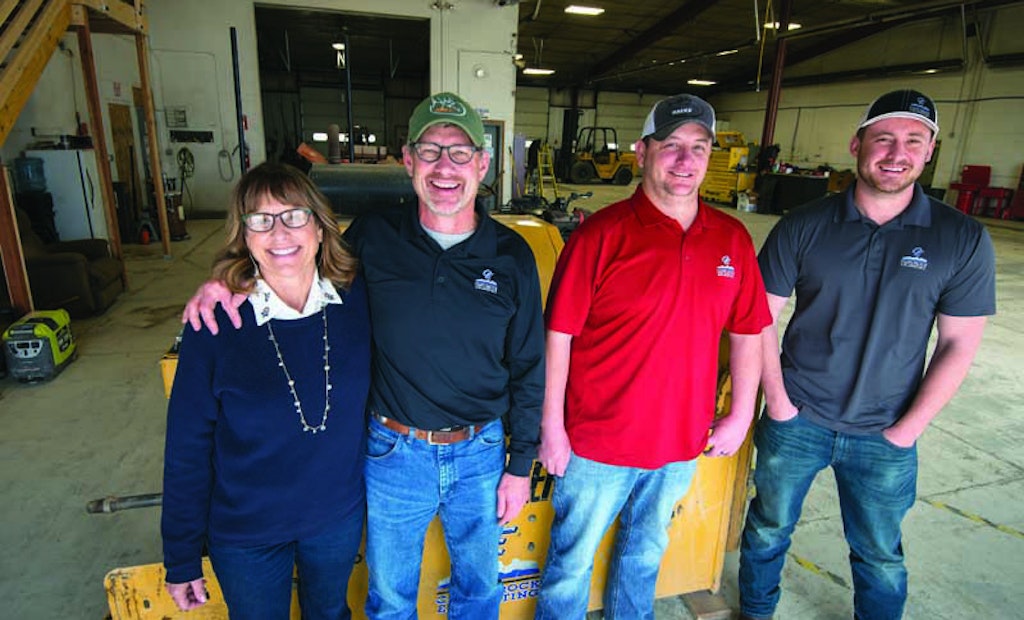
Interested in Relining/Rehab?
Get Relining/Rehab articles, news and videos right in your inbox! Sign up now.
Relining/Rehab + Get AlertsCastlerock Excavating’s evolution from a tiny excavation company developing water sources on local ranches into a large firm repairing and replacing municipal water and sewer lines has been gradual.
Duffy Duffield and his wife, Sheri, were living on a ranch 40 miles outside Billings, Montana, when they started developing water sources for cattle in 1996. When their two sons were ready for high school in 2001, they realized it was time to move and find other ways to grow the business. In Billings, the company moved into new construction.
“We did all the excavation for houses — digging foundations, backfill, water and sewer hookup, and the actual sewer system if it was not on city services,” says Duffield, who leads the team in the field while company president Sheri Duffield runs the office.
In 2006, they expanded into more municipal work and mainline sewer repair and replacement. They also began adding equipment and building a more substantial crew. They currently have 28 employees, and serve the City of Billings as well as nearby Laurel, with a population of around 7,000.
In 2011, they added HammerHead pipe bursting equipment for waterline replacement, while continuing to work in new construction and excavation.
Old equals opportunity
Duffield points out that much of the infrastructure in their local communities is reaching the end of its service life.
“That means work for us,” he says. “In some parts of town we have old asbestos pipe, and that is slowly being replaced. We have old clay tile sewers being replaced. It all depends on the funding.
“We are generally a subcontractor on these projects. When there is an emergency situation in Billings, we are sometimes called in to deal with a problem, but we are primarily a subcontractor.
“If the city has a bad sewer line somewhere and they do not have the manpower to take care of the problem, they will call us. They also call other contractors as well. Whoever is available that can throw a crew at it real fast will do the job.”
Infiltration is an ongoing battle in their service area, Duffield says, and root growth is a major culprit.
The City of Billings just completed a 1-mile reconstruction project that included installation of new water, sewer and stormwater lines. Castlerock was a subcontractor on the $3.8 million project, installing 42-inch concrete and PVC pipe.
Duffield says they don’t travel outside Billings with the excavating crew because it amounts to a huge mobilization with the heavy equipment. That’s why expanding pipe bursting services is a primary goal.
In spring 2016, the firm secured a contract with the Sheridan VA Medical Center in Sheridan, Wyoming, replacing 10,000 feet of waterline using their HammerHead MB80 pipe bursting system. This was their first venture into an adjoining state, and it was a multimillion-dollar project that Duffield saw as a good opportunity to promote their pipe bursting services outside their immediate service area. This job was for upsizing a 10,000-foot-long, 8-inch waterline with 10-inch pipe.
“Pipe bursting is a good business for us, and it’s the same price as open cut as far as putting pipe in the ground, but less invasive. There’s just the open hole at each end.
“For our pipe bursting we have a crew of up to four, and we carry that equipment on a 1999 single-axle International,” Duffield says. “We replace waterlines with C900 PVC pipe. We are equipped to deal with 4-inch up to 24-inch lines.”
Excavation jobs typically call for a five-man crew, with two excavators, a loader and various service vehicles. The company has six excavators ranging from 200- to 350-class machines.
They have four loaders from 3.5- to 5-yard, three compact track loaders, two side-dump trailers with trucks, and numerous pickups, fuel trucks, trench boxes and other miscellaneous items.
They operate out of a 3-acre site, with a 12,000-square-foot shop where two mechanics take care of the entire fleet.
Hiring smart
“In hiring we try to pick carefully,” Duffield says. “We want the best because we spend so much time and money on training the way we do things. Since we began hiring in 2006, we have had little turnover. Before that we tried to do it alone. We’ve enjoyed our growth.”
For pipe bursting, Duffield’s lead man received extensive training and instructs the others on the process. All workers are cross-trained, which provides benefits across all services, he says.
When hiring a technician for this type of work, Duffield says ideally he wants someone with experience in underground pipe — fusible pipe — but it’s not easy to find that kind of experience in their area. The slowdown of the oil industry in North Dakota has made it easier to find the experienced machinery operators he wants on his crew, however.
“We have to have good people,” he says. “I can interview four or five different individuals before I actually find the talent I want.
“Just because you can start a loader or excavator does not mean you are an operator, or mechanically inclined. Those people who were in the oilfields are coming back our way. We lost a lot of good talent because wages were so good over there.”
Duffield points out that they pay a good wage — up to $25 an hour — and an employee can eventually move to a salaried position that can generate a very substantial income.
At the end of the day
Duffield enjoys great satisfaction in seeing the company grow in so many directions, and he is most pleased when he sees the employees take pride in what they accomplish, and how they are able to make decisions.
“We work as a group,” he says. “When we bid a job, we involve the guys. We have our estimator, Colter Wiggs; and Joel Hoagland, who is second in command; and Jereme Hehn, who is our superintendent; and the others as well. I want their input.
“We ask ‘How do you want to do this?’ If I agree with their ideas we run with it. If we have a wreck, we will get it fixed but we don’t point fingers.”
Duffield notes that Montana is very much a rural state, and has a total population of approximately 1.025 million. There are a lot of wide open spaces, as opposed to the major population centers around the country, which in many ways dictates the inclusion of certain technologies. However, Castlerock Excavating is open to exploring and expanding as the opportunities arise.
In 2013, Duffield and a partner opened a sister company, Tru Pipe, offering CCTV, sewer cleaning and hydroexcavation.
“We had been putting in new piping around the city, and it is required all new sewer systems and storm drains be cleaned and inspected,” Duffield says. “We had been hiring a company to do this for us, but we decided we could make a payment on a truck for what we had been spending on this outside help. I had a partner, and we bought a 2003 Vactor 2100. We have two employees with Tru Pipe, a truck operator and a camera operator. We thought it more a financial benefit to have a sister company. It has been a huge positive for us.”
Keeping the company in line
Duffy Duffield leads the Castlerock Excavating team in the field. His wife and company president, Sheri Duffield, runs the show from the office.
Duffy is the face of the company when it comes to meeting clients to secure work and to address any other issues.
“Most of our work is negotiated,” he says. “For the actual day-to-day running of the company, we have a production meeting every Friday morning with our team, planning for our next week. Everyone can be involved in the planning and I can get my ideas in. We work to make sure each crew has an assignment.”
Duffield enjoys seeing the company grow in new directions, and he’s most pleased when he sees employees take pride in their decisions and accomplishments.
“I know what my employees are capable of,” he says. “I believe I give them the leeway to enjoy their job and to be successful.
“As for me, the busier I am in my work, the more I produce. When I get to the office each morning, I don’t know what is going to happen and I don’t necessarily have the days planned. I just take each thing as it comes.”
